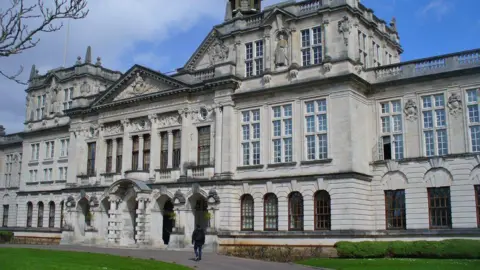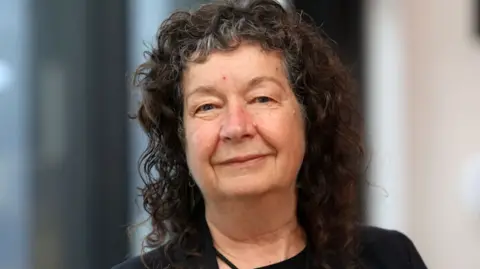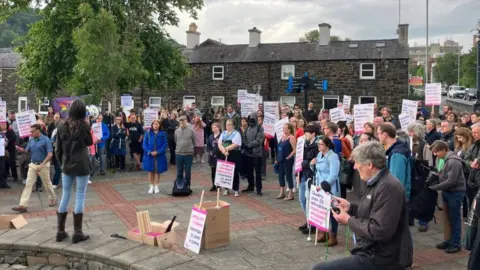Cardiff uni defends job cuts amid crisis claims
 Colin Smith/Geograph
Colin Smith/GeographCardiff University bosses have defended the way a process to cut hundreds of jobs and axe some departments has been handled.
Giving evidence to a Senedd Committee, Vice Chancellor Prof Wendy Larner said it had been "difficult" but they had taken "the right approach".
Prof Larner was asked whether announcing plans to close some departments, including nursing and then "backtracking" had been wise in view of the impact on staff morale and the institution's reputation.
It comes after a union claimed the process had led to a "severe and urgent mental health crisis" among staff.
Meanwhile, more than 100 Bangor University staff and supporters have taken part in a demonstration against staff cuts there.
Proposals initially included cutting 400 jobs and closing some subject areas including music, modern languages and nursing, which will now be retained.
Changes during the consultation period and more than 150 staff leaving voluntarily also led to a reduction in the number of posts to be cut - currently down to 69 by 2029-30 Prof Larner told MSs.
She said she was "delighted by the quality of the alternative proposals" which enabled them to change the initial plans "quite significantly".
But she confirmed the business case going to the university council for sign off on 17 June would still mean stopping ancient history and religion and theology.
When asked whether she had any regrets about the process, she said she regretted that some members of staff had learnt their jobs were at risk through media coverage after a "leak" of information.
She also expressed regret that the university had received an "undue share of attention" for the cuts despite many other universities facing similar challenges.
"Our intention all the way through has been to ensure that Cardiff University is successful for the future," she said.
 Cardiff University
Cardiff UniversityProf Larner and chairman of the University Council Patrick Younge's appearance in front of MSs follows the University and College Union's (UCU) claim there was a "total health and safety crisis" at the institution.
They said there had been a "comprehensive breakdown of trust and morale" between university bosses and staff.
"I think we've worked really hard to do what we can to ensure that staff have been adequately supported", said Prof Larner.
Mr Younge said the university had been "blindsided" by the UCU referring it to the Health and Safety Executive when it was due to agree a strategy to address the union's concerns.
Referring to the union's move, he said he was "deeply disappointed in some of the behaviours."
Mr Younge outlined the financial challenges facing the university and said its reserves had to be spent on securing the university's future - including improving halls of residence which, he said, required a spend of £300m to £400m.
Quizzed about the university's new campus in Kazakhstan's capital, Astana, Prof Larner said the university had spent money on "due diligence" but the campus, which opens in September, was paid for by partners in Kazakhstan.
She said so far there had been 186 application for the two foundation courses initially offered on the site which was part of a "slow rollout".
A Cardiff UCU spokesperson said that 400 academics remain at risk of redundancy and that the plans produced by the university "will further devastate" the institution and "fundamentally risk its future sustainability".
They added that, despite the university's "u-turn", there are still deep concerns that the "ongoing proposed cuts and restructure" risk Cardiff University's future reputation and financial security.
"The vice chancellor's answers to Senedd members today did nothing to alleviate those fears, and in some ways made them worse," the spokesperson said.

On Thursday, staff at Bangor University held a protest outside the college as part of an ongoing campaign against staff cuts.
The university has said it needs to lose the equivalent of 55 full-time posts, after initially announced it was cutting 78 jobs, to make savings, following voluntary redundancies and other cost-cutting measures.
Three unions - the University and College Union (UCU), along with Unison and Unite - are opposed to any compulsory job losses.
UCU is to ballot members next week about taking steps towards strike action.
"The longer it takes the university to take compulsory redundancies off the table, the further up the ladder towards industrial action," Amy Pritchard-Robinson, Bangor UCU president, told BBC News.
She described a "consistent cycle of restructure, voluntary severance and cuts" at the university.
This week it emerged that the university's vice chancellor, Edmund Burke, received a 13% pay rise last year, while the number of senior staff rose from 18 to 26.
"We have situations where staff are being told to do more with less, to explore reduced working hours, to explore job sharing but clearly the rules that seem to apply to staff don't apply to the executive and that's unfair," said Vivek Thuppil, the local UCU's vice president and a psychology lecturer.
Staff have until Friday to register interest in taking voluntary redundancy.
